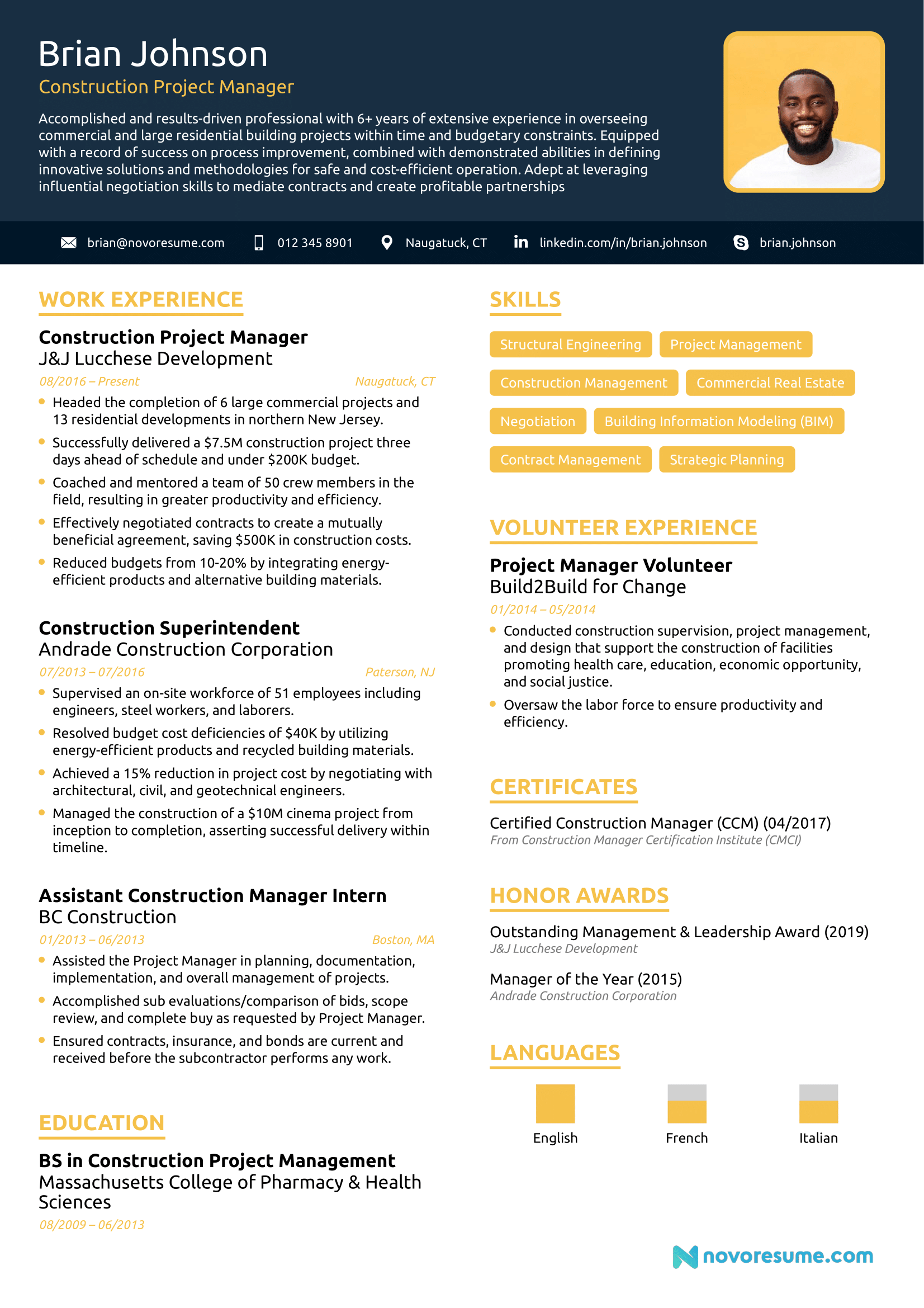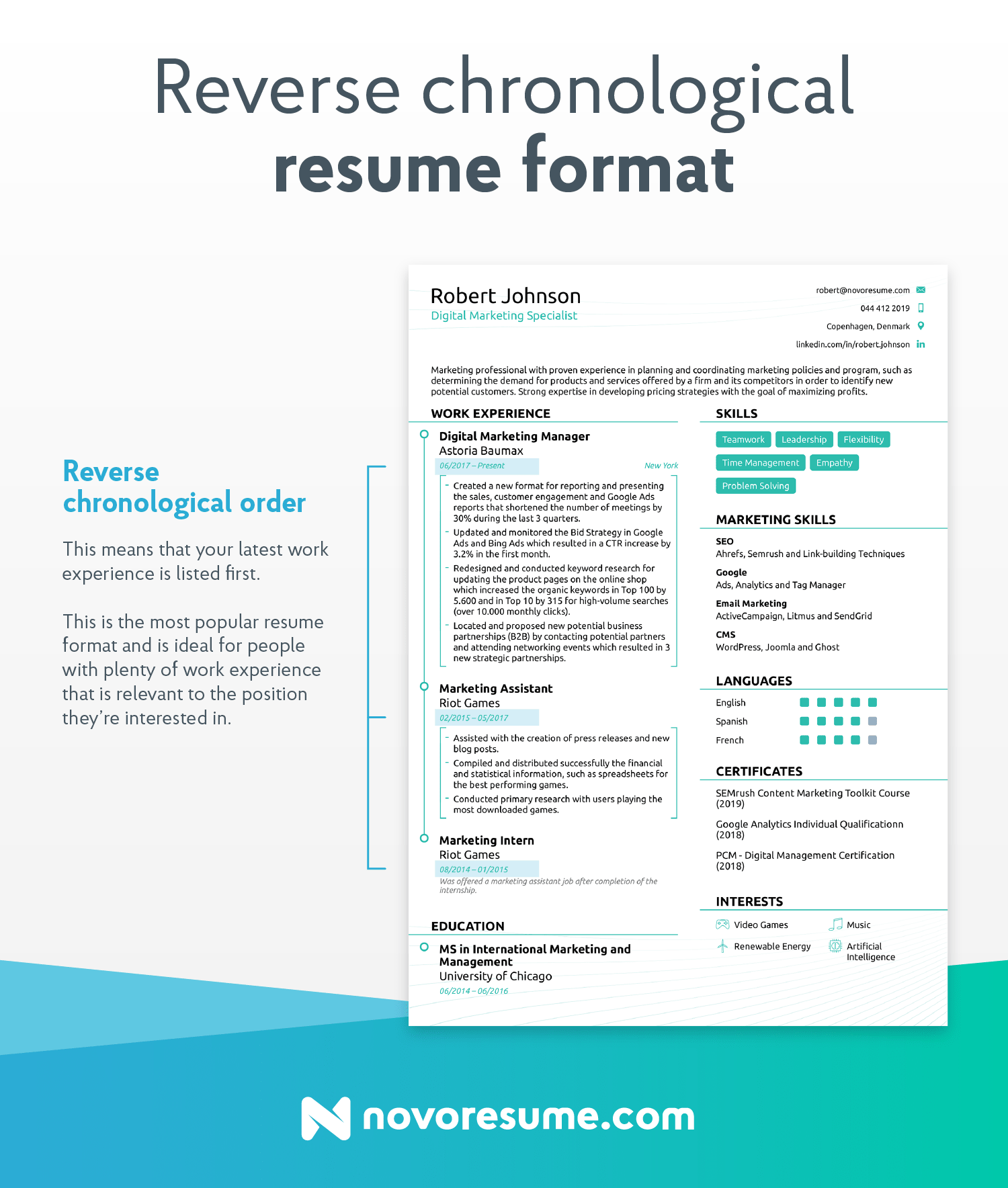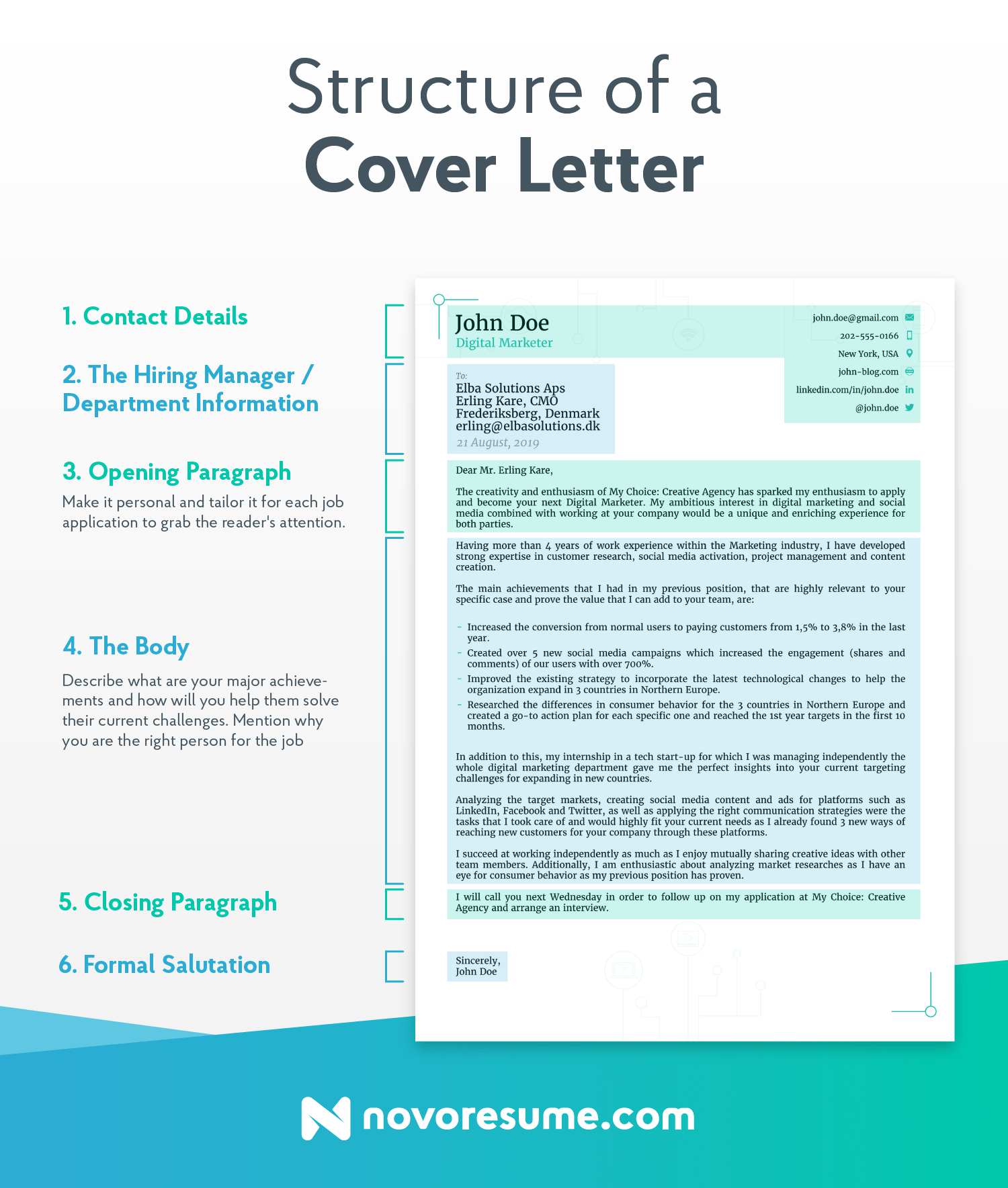As a construction project manager, you’re responsible for large-scale projects.
You will undoubtedly face many problems along the way.
But maybe you weren’t expecting to face one so soon: your resume.
Creating a resume is hard at the best of times, but especially for someone going for the role of construction project manager.
After all, how do you show your project management skills, construction knowledge, and leadership ability?
There are many questions to be answered, but don’t worry, simply follow our step-by-step guide for:
- A job-winning construction project manager resume example
- How to create a resume that hiring managers love
- All of the latest tips and tricks to make your resume stand out
Not feeling inspired yet?
Here’s a construction project manager resume example, created with our very own resume builder:

Keep reading through this guide to create a resume that looks as good (or better) than the above example!
How to Format a Construction Project Manager Resume
Before we get to the juicy details, you need to decide on the best format.
After all, the hiring manager will think twice before hiring a project manager who has a poorly-formatted resume.
Remember, your resume is the first chance you have to impress your future employer, so it needs to be professional.
The most common resume format is “reverse-chronological,” so we’d recommend starting with that:

Two other resume formats you may want to try are:
- Functional Resume – If you’re skill-strong but experience-poor, this is the format for you. The functional resume focuses on skills, which makes it ideal for individuals lack experience or have gaps in their employment history.
- Combination Resume – If you have both skills AND work experience, you may want to try a combination resume. The combination resume combines both the reverse-chronological and functional formats.
Once you’ve decided on the format, you need to get your resume layout right.
Here’s a quick summary of what we recommend:
- Margins - One-inch margins on all sides
- Font - Pick a font that stands out, but not too much.
- Font Size - Use a font size of 11-12pt for normal text and 14-16pt for headers
- Line Spacing - Use 1.0 or 1.15 line spacing
- Resume Length - Don’t go over the 1-page limit. Having trouble fitting everything into one page? Check out these one-page resume templates.
Use a Construction Project Manager Template
Ever made a resume using a normal text editor?
If so, you probably agree with us: it’s a total pain.
For starters, you end up messing around with the formatting longer than it actually takes to write the content.
Then, once everything is perfect, you make a single change, and BAM! Your entire resume falls to pieces.
To skip the headache, try using a construction project manager free resume template.
What to Include in a Construction Project Manager Resume
The main sections in a construction project manager resume are:
- Contact Information
- Work Experience
- Education
- Skills
If you want your resume to stand out more, you can also try these optional sections:
- Awards & Certification
- Projects
- Languages
- Interests & Hobbies
- Volunteer Experience
Now, let’s go through every section, and explain how to write each one.
Not sure which sections to use? Check out our guide to What to Put on a Resume.
How to Get Your Contact Information Section Right
The most crucial element in your whole resume is the contact section. After all, the whole purpose of the resume is to get them to contact you! As such, triple check that you’ve made no typos.
For your contacts, include:
- Full Name
- Title - Make this specific to the role you’re applying for, which in this case is “Construction Project Manager”
- Phone Number - Double-check, and then triple-check this. One small mistake can really ruin your chances
- Email Address - Make sure to use a professional email address (firstname.lastname@gmail.com), and avoid that email you created back in 5th grade (mikelovescake@gmail.com)
- Location - Applying for a job abroad? Mention your location
- Josh Fakester - Construction Project Manager. 101-358-6095. jfakester@gmail.com
- Josh Fakester - Construction King. 101-358-6095. joshlikespizza@gmail.com
How to Write a Construction Project Manager Resume Summary or Objective
The job market is fierce.
And because each job opening receives resumes by the hundred, it should come as no surprise that recruiters spend less than 6 seconds reviewing each resume!
This means one thing:
Your resume needs to catch the recruiter’s attention – immediately!
But how can you do this?
The answer is simple: use a resume summary or objective.
As a quick intro, both resume summary and objective are short, snappy sections that go on top of your resume, just under the contact information section.
The main difference between the 2 sections is that:
A resume summary is a 2-4 sentence summary of your professional experiences as a construction project manager.
- Driven project manager with 5+ years of construction experience for corporate and private clients. Strong history in meeting budgeting requirements and timeline targets. Passionate and ready to manage large-scale construction projects for Company X.
A resume objective, on the other hand, is a 2-4 sentence snapshot of your professional goals and aspirations.
- Motivated architectural engineer graduate seeks employment with Building Company X. Experience planning and coordinating projects at private construction sites in Boston. Adept at budgeting, problem solving, communicating, and organizing.
So, which one should you use on your resume?
Construction managers usually have a lot of experience, so a resume summary is the best and most commonly used option.
Resume objectives are more suited to those working in construction but never held a management position, or those who have held management positions but not in construction.
How to Make Your Construction Project Manager Work Experience Stand Out
It goes without saying, but your work experience is the most important section in your resume.
And as you’re going for a management role that takes on a lot of responsibility, the hiring manager will want to see that you’ve “been there and done it”.
Here’s how to correctly structure your work experience section:
- Position name
- Company Name
- Dates
- Responsibilities & Achievements
Construction Project Manager
Construkt Inc.
01/2015 - 06/2019
- Monitored 10 sites on a daily basis to check progress
- Daily delegation of responsibility to 34 members of staff
- Kept all projects on budget, while always being prepared for unplanned costs
- Managed a healthy relationship between key stakeholders and clients
As you may notice, the example places an emphasis on achievements, not just daily tasks.
So, instead of saying:
“Managed delegation”
Go for:
“Daily delegation of responsibility to 34 members of staff”
What’s the difference here?
The second quote is more specific. It creates an image in the reader’s mind, which allows them to see the benefits to hiring you for the job. You know exactly what the person did, and you can say that they’re reliable.
The first example doesn’t go into enough detail. Sure, you were in charge of delegation, but readers can’t tell how many people you delegated to, and on with what frequency.
Use Action Words to Make Your Construction Project Manager Resume POP!
- “Responsible for”
- “Worked in”
- “Created”
These are just some of the most common words you’ll find on ANY project manager resume.
And since you want to be different, we’d recommend avoiding them as much as possible.
Instead, use some of these power words to make your responsibilities and achievements stand out:
- Conceptualized
- Designed
- Devised
- Determined
- Drafted
- Formulated
- Introduced
- Initiated
- Launched
- Originated
- Spearheaded
How to List Your Education Correctly
The next section in any construction project manager resume is the “Education”.
All you need to here is list out your education entries, and you’re good to go!
- Degree Type & Major
- University Name
- Years Studied
- GPA, Honours, Main Courses, Thesis
B.A. in Construction Project Management
Boston State University
2012-2016
- Relevant Courses: Fundamentals of Construction Project Management, Construction Estimating & Documentation, Building Construction Drawing, Creating Construction Plans, OSHA Standards, MEP Plans and Specifications, Mechanical and Electrical Systems.
- GPA: 3.8
Before we move onto the next section, here are our answers to the most frequently asked questions on education:
What if I am still in education?
- Whether you’re still studying or not, you should still mention all courses that you have started.
Do I include my high school education in this section?
- Only if that is your highest education qualification. The hiring manager won’t care about your high school education if you have a construction degree.
Should I prioritise education or experience?
- Have relevant work experience? Then they go on top
Still have some questions? Check out our guide on how to list education on a resume.
Top 12 Skills for a Construction Project Manager Resume
When the hiring manager is looking over your resume, they want to see that you’re highly-skilled.
You see, hiring managers will be briefed about what skills to look for.
The danger is, if you don’t list your skills, the hiring manager will likely skip your resume altogether.
Need a dose of inspiration?
Here are some of the most common construction project manager skills:
Hard Skills for a Construction Project Manager:
- Project management & planning
- Commercial & residential development
- Job site health & occupational safety
- Civil engineering
- Pipeline asset management
- Building codes and regulations
Soft Skills for a Construction Project Manager:
- Communication
- Negotiations
- Team building
- Leadership
- Stress tolerance
- Risk management
- Now, soft skills are important for a management position, but we generally recommend not going overboard with them. Generic soft skills are harder to back up, and because of this, every resume contains the same soft skills listed.
Looking for the most comprehensive list out there? Check our mega-list of 150+ must-have skills.
Other Resume Sections You Can Include
At this point, you’re probably looking at your resume with pride, ready to send it over.
But wait, does your resume stand strong among the sea of resumes?
Imagine this: there are ten applicants with similar skills and experiences, but three of the applicants have gone a step further and talked about their successful portfolio, who do you think gets the interview?
Yep, those that included a portfolio.
Truth is, there are a number of other sections you can add to your resume, let’s look at a few:
Awards & Certifications
Did you win a competition during your studies?
Did you win an award at your previous job?
Have you completed a number of courses on Coursera?
If you’ve won or five, be sure to mention them in your resume!
Awards & Certificates
- “Best Presentation” - Boston University
- “Learning How to Learn” - Coursera Certificate
- AGC Certified
Projects
Are you passionate about all-things construction?
Well, that’s great! That’s exactly what your hiring manager likes to hear.
And the best way to display your passion is with a project.
Whether it’s a college class project or a personal side-hustle, HR would love to know more.
Here is the type of projects you could mention:
- Managing your own small-scale construction project
- University where you managed a team project
Languages
Now, a second language is very rarely a requirement when going for the role of construction project manager.
With that said, being able to speak multiple languages is always impressive.
Although this isn’t an essential part of your resume, but if you have space, go for it!
Make sure to split the languages by proficiency:
- Native
- Fluent
- Proficient
- Intermediate
- Basic
Interests & Hobbies
You enjoy managing construction projects, but why does the hiring manager need to know about your passion for climbing on the weekend?
Well, it says something about who you are as a person. It makes you more relatable and human.
You see, the company is looking for someone they’re going to enjoy working with.
Not sure which hobbies & interests you want to mention? We have a guide for that!
Include a Cover Letter with Your Resume
Following the tips in this guide will give you one of the best resumes the hiring manager will read.
But is this enough?
What if another applicant goes one step further by including a cover letter?
Well, then you’re in trouble.
You see, cover letters are still very important.
Cover letters show the recruiter that you’re passionate about working for this exact position, not just firing off your resume to every company out there.
As such, including a cover letter with your resume can significantly increase the chances of getting that elusive job.
Like when crafting your resume, you must first get the structure of your cover letter right. Here’s how to do that:

Here’s how to craft a winning Cover Letter:
Contact Details
Your personal contact information, including full name, profession, email, phone number, location, website.
Hiring Manager’s Contact Information
Full name, position, location, email
Opening Paragraph
Write a strong introduction that instantly hooks the reader. The opening paragraph should mention…
- The exact position you’re applying for
- Your experience summary and top achievements to date
The Body
Once you’ve got the hiring manager hooked, you can go through the rest of your background. Some of the points you can mention here are:
- Why you want to work for the company
- What do know about the company’s beliefs and culture
- What are your best skills and how do they benefit the company
- If you’ve ever worked in similar industries or positions
Closing Paragraph
This is where you:
- Conclude the points made in the body paragraph
- Thank the hiring manager for their time
- End with a call to action to continue the conversation. Something like, “I’d love to further discuss how my experience as an X can help the company with Y”
Formal Salutations
Use a formal closing, such as “Best regards” or “Sincerely.”
Creating a cover letter is hard, and it’s not worth taking any chances. Follow our step-by-step guide on how to write a cover letter.
Key Takeaways
So, that’s how to create a winning construction project manager resume! Simply follow the steps in this guide to land that dream role. Before you go, let’s quickly go through everything you’ve learned today:
- Choose the correct format for your construction project manager resume. If you have the experience, you should use a reverse-chronological format. For the layout, follow the best practices.
- Use either a resume summary or objective to keep the recruiter hooked
- Your work experience section should talk more about your achievements, instead of your responsibilities.
- Create a solid portfolio of your best work.
- Give a cover letter explaining why you’re best for the construction project manager job.


